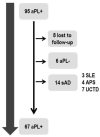Development of Systemic Autoimmune Diseases in Healthy Subjects Persistently Positive for Antiphospholipid Antibodies: Long-Term Follow-Up Study
- PMID: 36008983
- PMCID: PMC9406223
- DOI: 10.3390/biom12081088
Development of Systemic Autoimmune Diseases in Healthy Subjects Persistently Positive for Antiphospholipid Antibodies: Long-Term Follow-Up Study
Abstract
We longitudinally followed a single-center cohort of anti-phospholipid (aPL) positive healthy subjects to evaluate the evolution to systemic autoimmune diseases (sAD) and to describe clinical and serological associated features. Since 2010, we have consecutively screened healthy subjects who were positive, in at least two consecutive determinations, for one or more aPL [anti-Cardiolipin (aCL) IgM/IgG, anti-Beta2Glycoprotein I (aB2GPI) IgM/IgG, Lupus Anticoagulant (LA)]. All subjects were evaluated every six months, or in accordance with the patient's clinical course, in order to record the development of clinical and laboratory features suggestive for sAD. Ninety-five subjects [M/F 20/75, median age at first determination 46 years, Interquartile Range (IQR) 19] were enrolled. Thirty-three subjects (34.7%) were positive for only one aPL [15 (15.8%) for aCL, 15 (15.8%) for LA, and 5 (5.3%) for aB2GPI]; 37 (38.9%) had double positivity [32 (33.6%) for aCL and aB2GPI; 5 (5.3%) for aCL and LA], 23 (24.2%) had triple positivity. We prospectively followed up our cohort for a median period of 72 months (IQR 84). During a total follow-up of 7692 person-months, we found an absolute risk for sAD development equal to 1.8%. Specifically, 14 (14.7%) patients developed a sAD: in four patients (4.2%), after developing a thrombotic event, an antiphospholipid syndrome was diagnosed, 7 (7.4%) patients developed an Undifferentiated Connective Tissue Disease after a median period of 76 months (IQR 75.5), and lastly, three (3.1%) patients could be classified as affected by Systemic Lupus Erythematosus according to the ACR/EULAR 2019 criteria. The presence of triple positivity status resulted in being significantly associated with the progression to sAD (p-value = 0.03). In conclusion, we observed the development of sAD in almost 15% of aPL positive subjects. Triple positivity was significantly associated with this progression, suggesting a possible role as biomarker for this condition. Thus, our results could suggest the need for periodic follow-up for such patients to assess early diagnosis and treatment.
Keywords: antiphospholipid antibodies; autoimmune diseases; autoimmunity; systemic lupus erythematosus.
Conflict of interest statement
The authors declare no conflict of interest.
Figures
References
-
- Conti F., Spinelli F.R., Alessandri C., Pacelli M., Ceccarelli F., Marocchi E., Montali A., Capozzi A., Buttari B., Profumo E., et al. Subclinical atherosclerosis in systemic lupus erythematosus and antiphospholipid syndrome: Focus on β2GPI-specific T cell response. Arterioscler. Thromb. Vasc. Biol. 2014;34:661–668. doi: 10.1161/ATVBAHA.113.302680. - DOI - PubMed
MeSH terms
Substances
LinkOut - more resources
Full Text Sources


